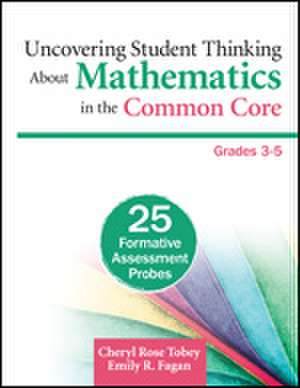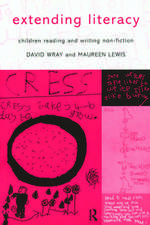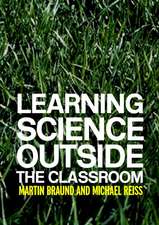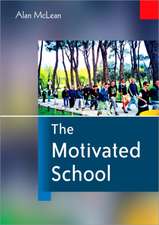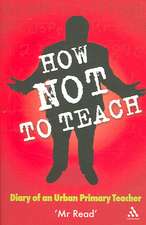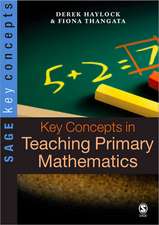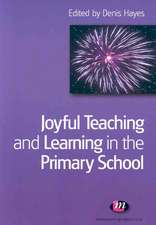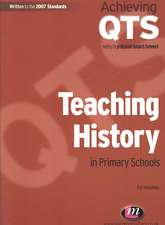Uncovering Student Thinking About Mathematics in the Common Core, Grades 3-5: 25 Formative Assessment Probes
Autor Cheryl Rose Tobey, Emily R. Faganen Limba Engleză Paperback – 27 ian 2014
- Quickly and objectively identify and correct students’ difficulties
- Systematically address conceptual misunderstandings and procedural mistakes-- before they become long-term problems
- Plan targeted instruction and remediation in multiplication and division, problem solving, the four operations, factorization, and beyond
- Master the essential CCSM mathematical processes and proficiencies for Grades 3-5
Preț: 292.25 lei
Nou
Puncte Express: 438
Preț estimativ în valută:
55.93€ • 58.32$ • 46.48£
55.93€ • 58.32$ • 46.48£
Carte tipărită la comandă
Livrare economică 21 martie-04 aprilie
Preluare comenzi: 021 569.72.76
Specificații
ISBN-13: 9781452270241
ISBN-10: 1452270244
Pagini: 248
Ilustrații: Illustrations
Dimensiuni: 216 x 279 x 15 mm
Greutate: 0.64 kg
Ediția:New.
Editura: SAGE Publications
Colecția Corwin
Locul publicării:Thousand Oaks, United States
ISBN-10: 1452270244
Pagini: 248
Ilustrații: Illustrations
Dimensiuni: 216 x 279 x 15 mm
Greutate: 0.64 kg
Ediția:New.
Editura: SAGE Publications
Colecția Corwin
Locul publicării:Thousand Oaks, United States
Cuprins
Preface: Mathematics Assessment Probes
Acknowledgments
About the Authors
Chapter 1. Mathematics Assessment Probes
Questioning Student Understanding: Determine the Key Mathematical Concepts You Want Students to Learn
Uncovering Student Understanding: Use a Probe to Uncover Understandings and Areas of Difficulties
What Is the Structure of a Probe?
QUEST Cycle: Structure of the Supporting Teacher Notes
Beginning to Use the Probes
How to Navigate the Book
Final Chapter 1 Thoughts
Chapter 2. Operations and Algebraic Thinking Probes
Completing Number Sentences
Multiplication and Division Sentences (Number Models)
Classifying Numbers Card Sort
Which Answer Makes Sense? (Working With Remainders)
Evaluating Expressions
Chapter 3. Number and Operations: Base-Ten Probes
Rounding Whole Numbers
Subtracting Whole Numbers
Are They Equivalent?
Rounding Decimals
Adding Decimals
Decimal Division Estimates
Chapter 4. Number and Operations: Fractions Probes
Locating a Fraction on a Number Line
Equivalent Fractions Card Sort
Representing Decimals
Comparing to 1/2
Fraction Estimates: Addition
Chapter 5. Measurement and Data Probes
What Does the Graph Say?
Comparing Lengths
Estimating Measures
Comparing Metric Measures
Chapter 6. Geometry and Geometric Measurement Probes
Finding Area
Naming the Perimeter
Volume of the Box
Classifying Angles Card Sort
Names of the Shape
Chapter 7. Additional Considerations
Establishing Learning Targets
Individual Metacognition and Reflection (The 4Cs)
Giving Student Interviews
Addressing Individual Needs
Promoting Math Talk
Supporting the Mathematical Practices
Sharing Experiences and Promoting Professional Collaboration
Summary
Appendix A. Information on the Standards for Mathematical Practice
Appendix B. Developing Assessment Probes
Appendix C. Action Research Reflection Template: QUEST Cycle
References
Index
Acknowledgments
About the Authors
Chapter 1. Mathematics Assessment Probes
Questioning Student Understanding: Determine the Key Mathematical Concepts You Want Students to Learn
Uncovering Student Understanding: Use a Probe to Uncover Understandings and Areas of Difficulties
What Is the Structure of a Probe?
QUEST Cycle: Structure of the Supporting Teacher Notes
Beginning to Use the Probes
How to Navigate the Book
Final Chapter 1 Thoughts
Chapter 2. Operations and Algebraic Thinking Probes
Completing Number Sentences
Multiplication and Division Sentences (Number Models)
Classifying Numbers Card Sort
Which Answer Makes Sense? (Working With Remainders)
Evaluating Expressions
Chapter 3. Number and Operations: Base-Ten Probes
Rounding Whole Numbers
Subtracting Whole Numbers
Are They Equivalent?
Rounding Decimals
Adding Decimals
Decimal Division Estimates
Chapter 4. Number and Operations: Fractions Probes
Locating a Fraction on a Number Line
Equivalent Fractions Card Sort
Representing Decimals
Comparing to 1/2
Fraction Estimates: Addition
Chapter 5. Measurement and Data Probes
What Does the Graph Say?
Comparing Lengths
Estimating Measures
Comparing Metric Measures
Chapter 6. Geometry and Geometric Measurement Probes
Finding Area
Naming the Perimeter
Volume of the Box
Classifying Angles Card Sort
Names of the Shape
Chapter 7. Additional Considerations
Establishing Learning Targets
Individual Metacognition and Reflection (The 4Cs)
Giving Student Interviews
Addressing Individual Needs
Promoting Math Talk
Supporting the Mathematical Practices
Sharing Experiences and Promoting Professional Collaboration
Summary
Appendix A. Information on the Standards for Mathematical Practice
Appendix B. Developing Assessment Probes
Appendix C. Action Research Reflection Template: QUEST Cycle
References
Index
Notă biografică
Descriere
Systematically address common mathematical misunderstandings by children ages 8 to 11, with 20 easy-to-implement assessments for continuously monitored learning.
